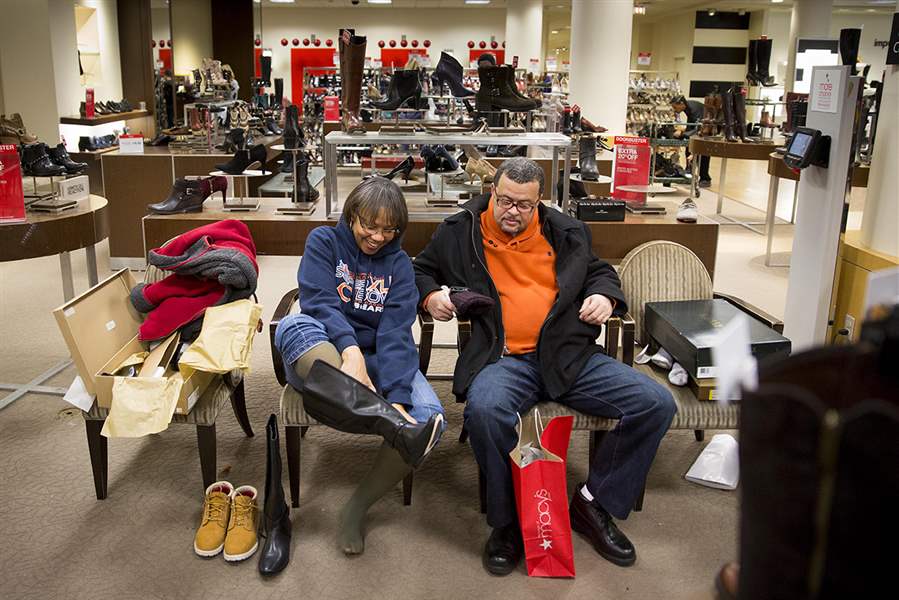
Firms try to entice ‘self-gifters’
Deals target those who buy for themselves
11/30/2013
Lorice and Marc Pullins of Chicago shop for shoes on Black Friday at Macy’s in Chicago. Black Friday savings also attract ‘self-gifters,’ people who jump on two-for-one deals to buy items for themselves.
ASSOCIATED PRESS

Lorice and Marc Pullins of Chicago shop for shoes on Black Friday at Macy’s in Chicago. Black Friday savings also attract ‘self-gifters,’ people who jump on two-for-one deals to buy items for themselves.
CHICAGO — Even the most clueless and bumbling gift-giver probably knows that it is not a good idea to give wrinkle cream, an electric toothbrush, or a vacuum cleaner to anyone for Christmas or Hanukkah.
“Great Savings for the Holidays on Bissell,” said the Amazon.com home page this week.
The Estée Lauder Anti-Wrinkle Essentials Value Set was a “gift of the day” on the Macys.com holiday beauty page. Among the site’s other head-scratching holiday deals: $50 off a Sonicare electric toothbrush.
All were aimed at a particular type of holiday shopper: the self-gifters — people who cannot resist taking advantage of the frenzied seasonal sale wars to buy a few things for themselves. (Those “buy one, get one free offers” are particularly potent bait.)
Even the classic gift of affection for others — jewelry — is fair game, and retailers know it. Under the banner Black Friday Jewelry Deals, Macy’s Web site coaxed: “This holiday season, get an unforgettable gift for a loved one (or yourself).”
A number of studies show that since the recession, and even a year or two before, self-gifters have been growing in numbers. Perhaps these shoppers have reasoned that big sales offer the only legitimate excuse to spend for themselves — or in years when their finances were improving, they were finally able to ease up enough to splurge on something.
Whatever the motivation, they’ve become a special demographic niche that retailers depend on heavily, so much so that many preholiday shopping surveys now track them.

Kevin Zeng of Milwaukee, Wis., shops for clothing on Black Friday at Macy's in Chicago.
But some recent surveys suggest this year that these shoppers may be a feeling a little less self-indulgent — a worrying prospect for companies heading into a season filled with uncertainty and weak sales projections.
Prosper Insights & Analytics, a consumer intelligence firm that conducts surveys on holiday spending for the National Retail Federation, for example, found that a smaller share of holiday shoppers planned to take advantage of discounts to buy “nongift items” for themselves or their family this holiday season, compared with last year or the year before.
Given that impulse-buying promotes self-gifting, retailers will be doing everything they can this year — overtly, subtly, and even subliminally — to tempt people.
Marshal Cohen, chief retail analyst at NPD Group, a research and consulting firm, is very familiar with retailers promoting items that really aren’t gifts.
“How many people are you going to buy a big-screen TV for?” asked Mr. Cohen. “That item is not necessarily a gift-giving item.”